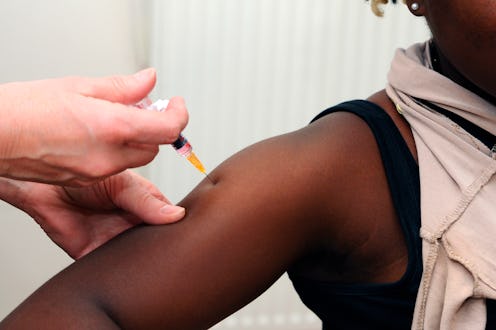
Back in the year 2000, the Pan-American Health Organization triumphantly declared that, thanks to a vaccination against it, measles had been eliminated from the United States. While there were still small outbreaks here and there, the transmission rate of the virus had been drastically reduced, and most outbreaks were connected to international travel. Today in 2019, unfortunately, the same cannot be said: Currently the United States is in the midst of a record-breaking measles outbreak, with over 700 reported cases across 22 states since January. The news about measles can be scary and confusing, especially for new parents, and you might find yourself looking for answers to even the most basic questions. How can you protect your child against measles? What are the signs? And is there a cure for measles?
The news makes the measles outbreak sound terrifying, and it's easy to tell yourself that things aren't as bad as they seem to be on the internet. But the truth is, things are pretty bad. Bustle spoke to Dr. Sandra Kesh, Deputy Medical Director of Internal Medicine at Westmed Medical Group, board certified in both internal medicine and infectious disease, who said, "We are in the midst of the worst measles outbreak in decades, with New York being one of the epicenters. Measles is extremely contagious: virus-laden droplets can hover in the air for up to two hours after an infected person has coughed or sneezed. Up to 90% of unvaccinated, exposed individuals will become infected. While there have been no deaths, 66 people have been hospitalized to date, and measles can kill 1 of every 1000 victims." In other words: take this seriously. It's a really big deal.
If you're really concerned about measles, you probably have one question on your mind: is this disease something that can be cured, and what do you even do if you or someone in your family gets it? The unfortunate truth is that there is no cure for measles at this time.
Dr. Kesh said, "If measles is contracted, over-the-counter fever reducers may help with symptoms, but, as with all viruses, your immune system needs to fight them off and that takes time." She suggests speaking with your doctor if you've been exposed to someone with measles to get their recommendations on what to do.
The good news is that, while measles may not be curable, it is still preventable. If you've been exposed to someone with the virus, Dr. Kesh suggests getting a "post-exposure vaccination, which when given within 72 hours of exposure, can provide protection against the virus." She also said you can try "an immune serum globulin (typically for pregnant women, immune-compromised people and infants) which is an injection of antibodies given within six days of exposure." This can help keep you safe from getting the disease, or at least make the symptoms a little better.
Dr. Kesh says that the best thing you can do is get the shot, adding, "Vaccination is the most effective method for the prevention of measles." You'll need two doses of the MMR (measles, mumps, rubella) vaccine to effectively prevent the disease. If you're an adult and you're worried about the shot wearing off, you can get a blood test to find out if you're still immune - although anyone born before 1957 is probably still immune if they got the vaccine.
Having second thoughts about getting vaccinated or getting a child vaccinated? Dr. Kesh explained that the vaccine helps create "herd immunity, which is indirect protection from an infectious disease." She also assured Bustle it's perfectly safe, saying, "One of the most common myths circulating is that the MMR vaccine causes autism — this has been proven wrong in multiple studies. There is NO known link between this vaccine and autism — it is a safe and effective vaccine, and can save lives!"
If you're on the fence about the vaccine, remember: there is no known cure for measles, and doctors can't say if there ever will be. It's not worth the risk!